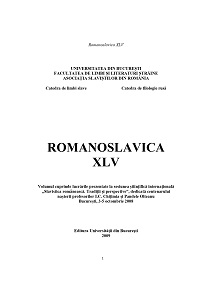Reflecţii patriotice şi pacifiste în cazaniile româneşti şi postilele polone din secolele al XVI-lea şi al XVII-lea
Patriotic and Pacifist Reflections in Romanian Homilies and Polish “Postylles” in the 16th and 17th Century
Author(s): Eugenia ŞtefanSubject(s): Christian Theology and Religion, Historical Linguistics, Comparative Linguistics, Western Slavic Languages, 16th Century, 17th Century, Philology
Published by: Editura Universităţii din Bucureşti
Keywords: Patriotic and Pacifist Reflections; Romanian Homilies; Polish “Postylles”; 16th and 17th Century;
Summary/Abstract: In this essay we intended to point out mainly the role of the Romanian homilies in the development of our mother tongue, the shaping of the reading taste, and the formation and evolution of our culture. We paid special attention to the two collections of homilies, i.e. “Expound Gospels” (1567) and “The Gospel Lesson” (1581), translated and printed by Coresi in the language spoken by the people for the illiterate to understand it. On the other hand, in Poland, thanks to the Catholic Church that recommended the priests to say prayers and sing religious songs in Polish, and not in Latin, a hardly intelligible language, they had written in the language spoken by the people ever since the middle of the 13th century. The urge to write homilies in this language was felt mostly in the 16th century when there was an increased need to reinforce the catholic faith, menaced by the Reform: the Protestantism and the Calvinism. The greatest representative of the Calvinist writers was Mikolaj Rej, whom professor I.C. Chiţimia considered to be the first great national Polish writer. The Polish experts in old literature praised M. Rej as “the father of the Polish literature”, and compared him to Dante and even to Cicero. “Hic est noster Cicero”, the Calvinist homilies writers would write about him. In the 16th century, the Catholic Church was brilliantly represented by Piotr Skarga, the author of the famous “Kazania Sejmowe” (out of which only eight homilies were preserved). In this essay we presented a few fragments of P. Skarga’s 8th homily, a sample of deep patriotism, just like the 16th and 17th century Romanian homilies. Therefore, we can say without any trace of exaggeration that both the Romanian homilies and the Polish “postylles” reinforced everlasting values such as: love for the country and for its people, honour, mutual help, liberty, national independence and faith: in Orthodoxism as for Romanians, and in Catholicism as for the Polish people. They also generated a double revolution: 1) in religion by re-creating the Church in the very language spoken by the plain people and 2) in culture by contributing to the creation of the national Romanian and Polish languages.
Journal: Romanoslavica
- Issue Year: XLV/2009
- Issue No: 2
- Page Range: 167-178
- Page Count: 12
- Language: Romanian

